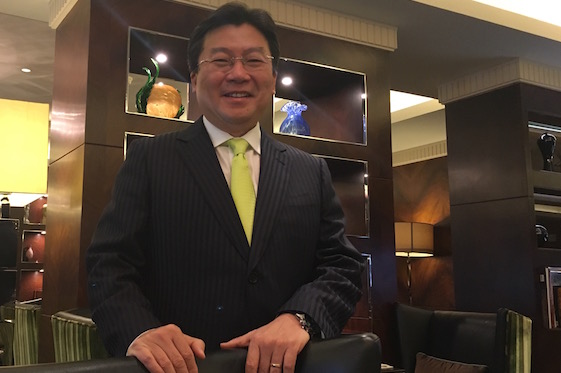“To have inbuilt history is a definite marketing advantage – and who else has a nonagenarian jazz band playing every night?” asks George Wee, general manager of Fairmont Peace Hotel, Shanghai, China.
The sprawling 270-room hotel, at Number 20 on Shanghai’s famous riverside The Bund, traces its roots to 1926, when banker Sir Victor Sassoon asked architect Tug Wilson to build him an office, keeping to a budget of $5 million. This evolved into The Cathay Hotel and, explained Wee, a passionate amateur historian, it was renamed the Peace Hotel after China hosted its first international peace summit in 1956.

“I feel very humble to be based in a building with such a story to tell. Sir Victor used to entertain Charlie Chaplin, and stars of the caliber of Marlene Dietrich,” he said. In an attempt to expel invading Japanese forces, the hotel was bombed by the Kuomintang (Chinese Nationalists) at 4:27 p.m. on August 14, 1937, and in 1941 the Japanese army occupied the building.
Since 1951 it has belonged to the Shanghai government and Jin Jiang Group, which gave it to Fairmont to manage in 2007. The hotel underwent a complete renovation, re-opening July 28, 2010, in the presence of a Mr. and Mrs. Tong who had married here 53 years before. Now part of AccorHotels, it remains a popular wedding venue, especially in its Peace Hall ballroom, with an original white maple dance floor.
“Our Old Jazz Band, which had been paying here nightly since 1980, was so happy to be back – they played other hotels during our refurbishment but they wanted to come home. Today the oldest member of the group is 94: The band plays from 6:30 p.m. until 9:30 p.m., and then a slightly younger group, the band-in-waiting, takes over until the early hours. The Old Jazz Band, plus the building’s history, plus being right on The Bund, are the main reasons first-timers choose to stay with us. Overall, average stay is three nights: 15% of guests are from the USA, and 60% are from Greater China,” he explained, adding that repeaters come for the service.
“My challenge is that I need a team of 500, and despite having such stalwarts as front office ambassador Henry Wang, who has been here over 48 years, I still closed 2017 with 29% staff turnover. China’s former one-child policy increases the difficulty of getting young people, and their parents and grandparents, to see hospitality as a desirable career. Everyone is in the same boat. I rely substantially on referrals from my team, plus instilling a sense of belonging, in a good working environment,” Wee explained.
Now also overseeing all Fairmonts in China, plus one Sofitel, he never envisaged his current life. Back home in Kuching, Malaysia, he was, at 17, joking around with some mates and they decided to go to hotel school in England. His first training was a breakfast waiter, working with some mature ladies – they were at least 50 – and in six weeks he became their supervisor. He joined Shangri-La Hotels & Resorts, and was with that company for 21 years before being enticed away, in 2013, by Jennifer Fox, then global president of Fairmont.
“Turning the Peace Hotel around was the goal,” he recalled. This was achieved in 2015, and each successive year has been better. 2017 brought another excellent result, closing at two points up on 2016. “I think Sir Victor would have approved,” he said with a smile.
